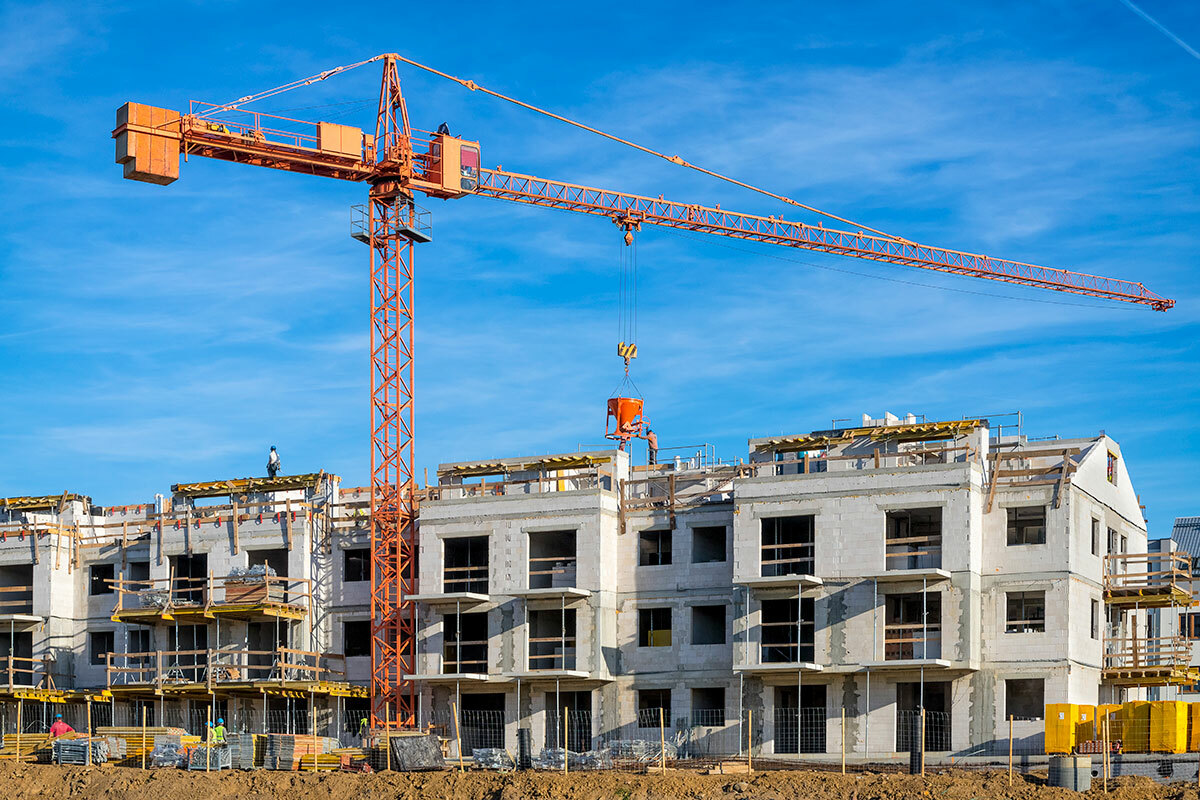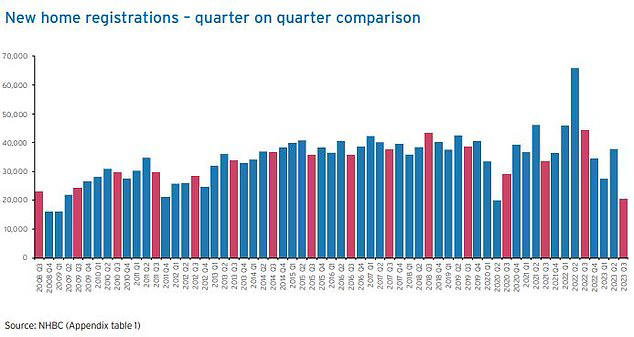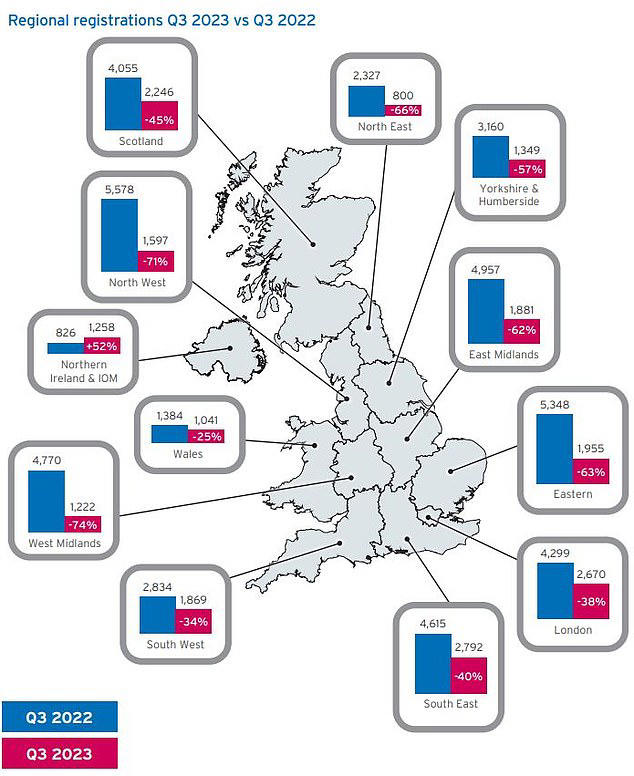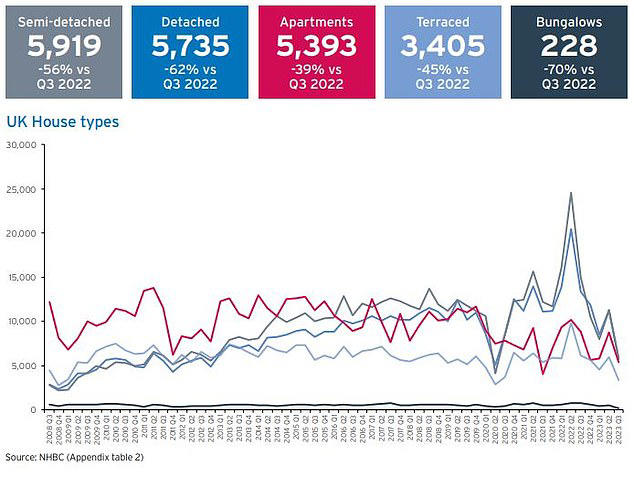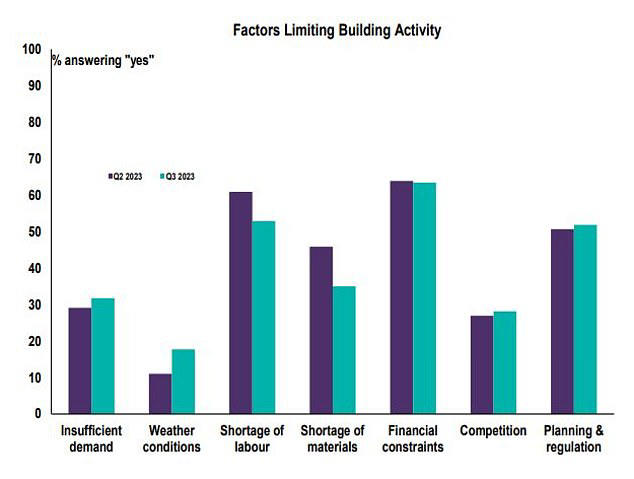Housebuilding has fallen for 11 months in a row as high borrowing costs hit demand for new homes.
S&P Global said its index of activity in the UK construction sector – where scores below 50 show contraction –came in at 45.6 in October. That was up slightly from 45 in September but still the second weakest reading since May 2020 during the depths of the Covid-19 pandemic. The slump was steepest in house building followed by civil engineering.
The analytics group's report noted 'signs of stabilisation' in commercial building. 'Falling work on residential construction projects was widely linked to a lack of demand and subsequent cutbacks to new projects,' the report said.
On a more positive note, builders saw the cost of doing business fall at the fastest pace for 14 years, with the price of materials such as timber and steel, as well as transportation, on the slide. The Bank of England has raised interest rates from a record low of 0.1% to a 15-year high of 5.25% since December 2021 in a battle to get inflation under control.
That has pushed up mortgages, and while it is hoped interest rates have peaked, a cut is not expected until well into next year. Higher borrowing costs have slammed the brakes on the housing market with builders scaling back construction plans as a result.
John Glen, chief economist at the Chartered Institute of Procurement & Supply, said "the silver lining is that high borrowing costs are having their intended effect of putting the brakes on rising inflation. However, there is no doubt that UK construction is in a difficult period and there will likely be further challenging months to come."
The largest listed residential developers recorded total profits of £4.7billion last year. But that figure looks likely to almost halve to £2.5billion, according to analysis by the Mail.
Persimmon is due to publish its latest trading update today and Taylor Wimpey on Thursday. Builders are selling fewer homes after the Bank of England raised interest rates to a 15-year high, pushing up mortgages. Analysts said housebuilders were 'battening down the hatches and weathering the storm'.
- Number of new homes registered to be built fell by 53% annually, says NHBC
- Analyst says they are slowing build rates to keep prices higher
- Rics construction survey also saw most downbeat month since lockdown
Figures released by the National House Building Council, the UK's largest provider of new home warranties and insurance, show the number of new homes being registered with them has fallen by more than half year-on-year.
Registrations happen when a developer or housebuilder register their intent to build a new home. The NHBC says the number of new homes registered fell by 53% in the third quarter of this year compared to the same three month period, last year. A total of 20,680 new homes were registered in July, August and September this year, compared to 44,153 during the same three months in 2022, a fall of 53 per cent.
This was the lowest number of registrations recorded over a three month period by the NHBC since April, May and June 2020, when the property market shut down during the first Covid-19 lockdown. During that three month period, a total of 20,024 new homes were registered - only 656 fewer than the number registered in the three months between July and September this year.
According to Anthony Codling, head of European housing and building materials research at RBC Capital Markets, Britain's housebuilders are slowing the rate at which they build homes to protect house prices. He said "the number of new build homes for sale and the number of sites coming soon is falling as housebuilders slow build to protect price. We believe this is a function of the weaker sales market - housebuilders will work to limit homes coming to market to prevent a supply glut if demand is weak."
Shutdown: This is the lowest number of registrations over a 3 month period recorded by the NHBC since the three months between April and June 2020 and the first Covid-19 lockdown
© Provided by This Is Money
The NHBC covers between 70% and 80% of all new homes built across the UK. It said new home registrations by private sector companies were down 57% year-on-year while registrations for rented properties and affordable homes were down 43%.
Aside from a collapse in new registrations, it also said that the number of new homes completed has fallen by 15% year-on-year.
Steve Wood, chief executive at NHBC said "the slowdown in house building was due to economic conditions. House-building activity is a key indicator of the health of the UK economy. With stubbornly high interest rates, persistent inflationary pressures, an ineffective planning system and an increasingly complex regulatory environment, it is no surprise fewer homes are being built."
However, he remained confident about the future of house prices, reflecting other property market forecasts this week.
"While consumer confidence has taken a knock over high mortgage rates and the increased cost of living, new home prices are generally holding up, in part because of incentivised sales," Wood said.
Midlands and North bear brunt of building cut
Regional divide: NHBC registrations fell by a whopping 74% in the West Midlands, 71% in the North West and 66% in the North East
© Provided by This Is Money
On a regional level, new build registrations fell by a whopping 74% year-on-year in the West Midlands, 71% in the North West and 66% in the North East. Areas seeing smaller falls included Wales at 25%, the South West at 34% and London at 38% compared to last year. Northern Ireland completely bucked the trend with registrations up 52%.
Some types of property have also been more impacted than others. For example, NHBC registrations for detached homes are down 62% and bungalow registrations are down 70%, whereas apartment registrations are down 39%.
NHBC's findings align with the latest Royal Institution of Chartered Surveyors (Rics) UK construction monitor survey, which has recorded its most downbeat monthly result since the early months of the pandemic. This survey is a quarterly sentiment poll of almost 1,400 chartered surveyors who operate across the UK.
It said construction workloads are now in negative territory with residential house building slowing down in particular. This, it said, was because housebuilders were facing fewer sales and tougher price negotiations. The majority of those surveyed reported that it was harder to secure a mortgage, and two thirds said this was limiting housing market activity in their areas.
Bungalow blow: NHBC registrations for detached homes are down 62% and bungalow registrations are down 70%
© Provided by This Is Money
Labour shortage and higher costs: 40% of respondents are still drawing attention to problems in hiring the likes of bricklayers, carpenters, plumbers and electricians, according to Rics
© Provided by This Is Money
Sam Rees, senior policy officer at Rics, said "the latest reported drop in housebuilding highlights the urgency to launch a structured, holistic plan for tackling the housing crisis. While the Government's recently announced intention to meet its target of one million new homes before the end of this parliament is laudable, detail on how this will be achieved is still missing."
Simon Rubinsohn, chief economist for Rics added "the tougher environment around the housing market is now coming through in terms of a slowing in the build out rate of new developments according to feedback from Rics members. This suggests that housing supply is likely to fall at least for the next year compounding the problems already being faced by many of those looking to get a first step on the property ladder or move into the rental market."
Will the Government do anything about the lack of homes?
The majority of people are in agreement that the UK has a housing shortage and that many more homes are needed.
Both the current Government and the Labour party have pledged to increase the number of homes being built. The Conservatives have promised to deliver 300,000 new homes a year by the mid-2020s, while the Labour party says it will build 1.5 million homes over a five year period, if it comes to power following the next general election.
What appears to be happening, at least in recent months, is exactly the opposite. RBC's Codling said that if the current situation persists, the likelihood of Government stimulus will increase.
'The housing market is not in free fall, and the reduction in build today will impact 2024 more than 2023 as homes being built this late in the year are typically for delivery in 2024,' he said.
'Should the housing market continue to slow, the likelihood of a pre-election housing market stimulus increases, and the impact of any stimulus tomorrow is likely to outweigh the challenges of today.'
5.5% of UK homes sit empty
Some 5.5% of housing stock in England and Wales is “truly vacant”, according to data from the Office for National Statistics. This amounts to 1.5 million, which is eight times the number of the 172,800 properties classed as second homes. The census data suggests housing developers and wealthy owners are holding onto property they don’t occupy – calling into question the tax system
Andrew Wishart, senior property economist at Capital Economics, said "having a relatively light levy on housing compared to upfront costs is partly to blame. Rather than having any sort of ongoing tax on the value of homes that might nudge people away from this, we’ve got stamp duty which discourages transactions. If you could do something on tax that makes this kind of (hoarding) behaviour more costly, then potentially that’s an easier thing to do than raising house-building.”
London had the highest proportion of unoccupied homes, at 8%, of which 91.6% were vacant and 8.4% were second homes.
The ONS data is based on information from the 2021 Census, which may be skewed due to behaviours during the covid-19 pandemic, when some people left cities like London to stay with relatives over the period.
However the ONS said it asked people where they “usually” lived when taking the data to reduce inaccuracies.

